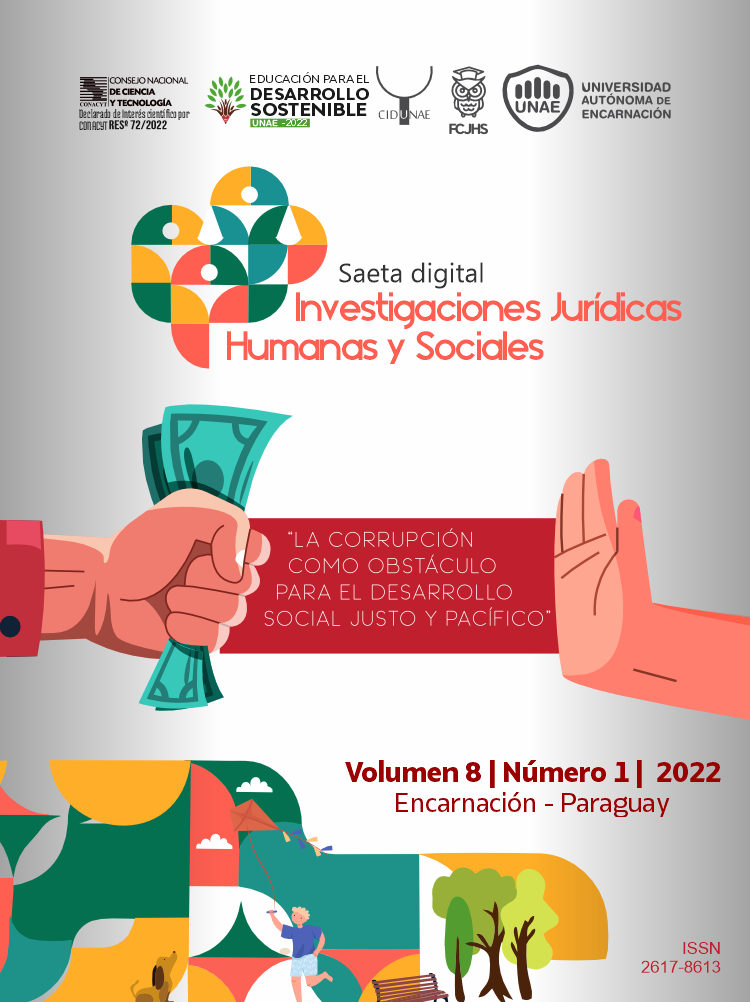ADMINISTRACIÓN PÚBLICA EN PARAGUAY Y EL FUNCIONAMIENTO DEL INSTITUTO PARAGUAYO DEL INDÍGENA: COMO MÁQUINA, ORGANISMO Y PULPO
Palabras clave:
Administración pública, INDI, Burocracia, Organismo, AdaptaciónResumen
La investigación describe los modos en que se encuentra actualmente el Instituto Paraguayo del Indígena (INDI). Analiza los diferentes niveles de actuación desde la percepción de sus funcionarios. Con ayuda de teorías y metáforas, se elaboran tres modelos de funcionamiento: el primero es el modelo máquina desde el enfoque teórico de Max Weber. En este modelo se presenta a la institución como eficiente, procurando que funcione como un engranaje controlado al estilo de una máquina. El segundo es el modelo organismo desde el aporte teórico de Niklas Luhmann en cuanto a la toma de decisiones en las organizaciones, con adaptación, flexibilidad y adecuación. El tercero como un modelo pulpo utilizando la idea de Clifford Geertz. El INDI se ve como una institución pensada como una máquina al estilo Max Weber, de un organismo según Luhmann, que puede combinar a la vez varios modelos de funcionamiento. Según la necesidad, se acentúa uno u otro modelo de actuación. Se trata de una institución que se adapta como un organismo, maneja interna y externamente sus procedimientos burocráticos, acomodándose de modo flexible a las demandas de los destinatarios de sus acciones como lo expresa el modelo pulpo de Clifford Geertz.
Citas
Aguero, J. (2010). Niklas Luhmann y los sistemas autopoiéticos. VI Jornadas de Sociología de la UNLP. Universidad Nacional de La Plata. Facultad de Humanidades y Ciencias de la Educación. Departamento de Sociología, La Plata.
Becker, H. (2018). Trucos del Oficio. Editorial Siglo Veintiuno Editores, Tercera edición.
Brun, D. A. (2012). Estatalidad y calidad de la democracia en Paraguay. América Latina Hoy, 60, 43-66
Ceamso (2016) Análisis del FONACIDE en Paraguay. Una oportunidad hacia la construcción de políticas públicas descentralizadas, participativas y transparentes (2016)
Galeano, L. (2009). La hegemonía de un Estado débil. Asunción: CPES.
Ganhao, M.T. (1997). Las metáforas organizacionales. Papers, 51, 183-189.
Geertz, C. (2003) La interpretación de las culturas. Duodécima impresión. Editorial Gedisa. S. A. Barcelona.
Gonnet, J. (2012) Organización y burocracia: Una revisión crítica de la interpretación de los planteos weberianos en la sociología de las organizaciones. VII Jornadas de Sociología de la UNLP, 5 al 7 de diciembre de 2012, La Plata, Argentina. Argentina en el escenario latinoamericano actual : Debates desde las ciencias sociales. EN: Actas. La Plata: UNLP-FAHCE. http://www.memoria.fahce.unlp.edu.ar/trab_eventos/ev.1991/ev.1991.pdf
Guttandin, F, Penner, H (2005). “Administración y cultura en Paraguay desde la perspectiva de funcionarios de alto rango” GIZ. Asunción.
Guttandin, F (2012) Investigación cualitativa interpretativa: una caja de herramientas. CEADUC. Biblioteca Paraguaya de Antropología Vol. 84.
Ley 904/81 “Estatuto de las Comunidades Indígenas” Instituto Paraguayo del Indígena.
Luhmann, N. (1998) Sistemas sociales. Lineamientos para una teoría general, Barcelona, Antrhopos-Universidad Iberoamericana-Centro Editorial Javeriano Pontificia Universidad Javeriana.
Luhmann, N. (1997) Organización y decisión. Autopoiesis, acción y entendimiento Comunicativo (Dario Rodriguez, trad.) México, Antrhopos editorial-Universidad iberoamericana. (Obra original publicada en 1978)
MEC, CIIE, (2014) La Lengua Guaraní en el Sistema Educativo en las dos últimas décadas.
Weber, M. (2004) Economía y Sociedad. Fondo de Cultura Económico. México.
Publicado
Número
Sección
Licencia
La responsabilidad del contenido de los artículos publicados es de competencia exclusiva de los firmantes del artículo y de ninguna manera será atribuible a la Editora o al Comité Editorial de la revista.
Los autores de los artículos son los responsables de la obtención del permiso correspondiente para incluir en su artículo cualquier material publicado en otro lugar. La revista declina cualquier responsabilidad que se derive de la posible falta de permiso en la reproducción de cualquier material.
Los autores ceden a la Revista la propiedad de sus derechos de autor, para que los artículos sean publicados en cualquier forma o medio.
La Revista se reserva todos los derechos de autor y la reproducción de los documentos en otros medios impresos y/o electrónicos que debe estar autorizada por el Editor.

